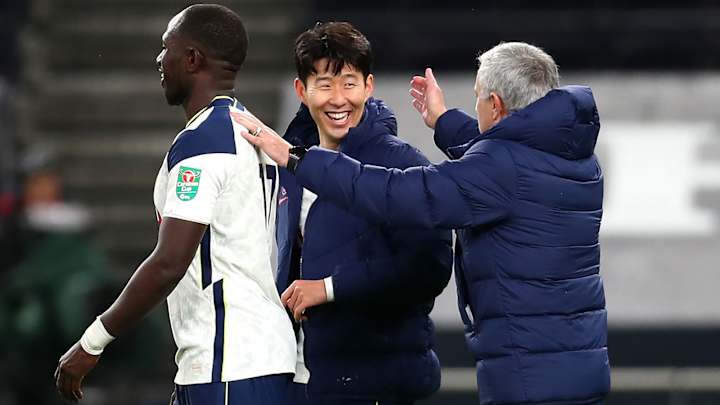Tottenham's Strange Season and the Chance to End Its Trophy Drought

There have been more dramatic semifinals. There have been more memorable cup runs. But Jose Mourinho and Tottenham are unlikely to care.
A comfortable 2-0 win over Brentford, secured with a Moussa Sissoko header and a classic Son Heung-min breakaway, booked Spurs’ place in April’s League Cup final against either Manchester United or Manchester City and the possibility of winning the club's first trophy since 2008.
This has been a very strange season for Tottenham. It began abysmally with a desperately flat defeat to Everton, but then caught light. A run of 11 league games without defeat raised talk of an improbable title challenge. Son and Harry Kane became the most deadly partnership in the league, opponents apparently unable to deal with Kane dropping deep and Son running beyond him from the left, with Steven Bergwijn, for the most part, a willing chugger on the right.
But within that 11 games there was a subtle shift. It began with a certain freedom. Spurs put five past Southampton and six past Manchester United. But three goals conceded in the final 10 minutes in the 3-3 draw at home to West Ham led to a reassessment. Mourinho had his side retreat. Tottenham began to play even more with a low block, looking to use the pace of Son and Bergwijn on the counter.
To an extent, it worked. Manchester City and Arsenal lured into overcommitting and were picked off on the break. Chelsea was so anxious about the possibility of being countered against that it accepted a 0-0 draw almost from the opening kick. Mourinho’s swagger returned. Suddenly he was funny again. Football remembered why it had been charmed by him when he first burst onto the consciousness at Porto and Chelsea.
Amid the weirdness of this season, his football seemed to make sense. The truncated preseason and the compressed calendar made it hard for the more sophisticated pressing teams to create their structures. Fatigue, far earlier than usual, became a factor. Tactical evolution regressed. Football came back to Mourinho. When Spurs went to Anfield prior to the festive fixtures, it seemed a like a game that could end up being regarded at the end of the season as having been decisive in the title race.
Spurs invited pressure, fell behind then nicked an equalizer. In the second half, it presented a major danger on the break. Bergwijn hit the post. Kane had a close-range header bounce over the bar. And then, with a quarter of an hour remaining, Mourinho removed Bergwijn and replaced him with a second left back, Sergio Reguilon. Tottenham lost all of its attacking threat and Liverpool found a late winner.
Four days later, Spurs lost at home to Leicester and, almost as soon as it had emerged, the title challenge vanished. It wasn’t just the two defeats; it was the manner of them. Tottenham this season has squandered nine points in the final 10 minutes of games. Perhaps the draws against Newcastle and West Ham were slightly freakish, but in the draws at Crystal Palace and Wolves, as well as the defeat to Liverpool, the sense was of Tottenham needlessly inviting pressure.
Even in the bizarre environment of 2020-21, a policy of containment is fraught with risk. Yet Mourinho seemed deliberately to flirt with that, as though determined to prove a point: that his style of football, the anti-possession football he adopted with such assiduousness after being overlooked for the Barcelona job in 2008, can still prevail.
Tottenham remains fourth, four points behind the leader Liverpool with a game in hand, and so is still very much part of the title race. But the win over Brentford offers a far more immediate chance of a trophy, one that seems almost to have arrived without any warning. Given a bye to the third round because of European commitments, Spurs were then given a walkover when Leyton Orient was struck down with COVID-19. A penalty shootout victory over Chelsea and a straightforward 3-1 win at Championship side Stoke City was all it took to reach the semifinal against another Championship club.
After Brentford had a would-be equalizer ruled out by VAR, Tottenham doubles its lead through Son Heung-min and has one foot in the League Cup final
— SI Soccer (@si_soccer) January 5, 2021
(via @ESPNFC) pic.twitter.com/27HSxQiQgR
Underwhelming as the run to the final may have been, though, Mourinho will embrace it. He has won the League Cup four times before and would relish being the first Tottenham manager to win a trophy since Juande Ramos’s side won the '08 League Cup. Whatever happened then, he would always have that over his predecessor, Mauricio Pochettino, of whom the criticism was always that whatever miracles he may have worked to establish Spurs as a Champions League side on a limited budget, he never actually won any silverware.
Come April at Wembley, particularly if fans are allowed back by then, nobody will be asking how Tottenham got to the final. This may feel like a bonus opportunity, but it is one it will gleefully accept.

An accomplished author of multiple books, Jonathan Wilson is one of the world’s preeminent minds on soccer tactics and history.